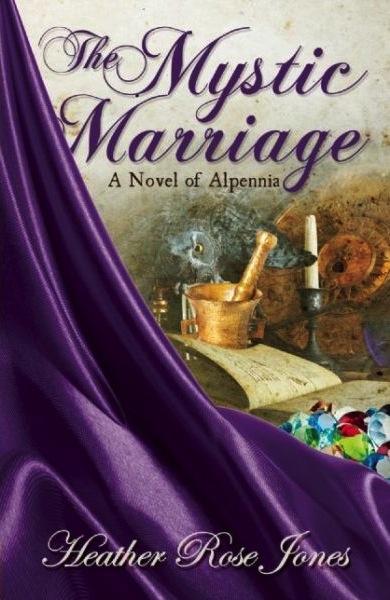Alchemy. Intrigue. Intellectual women. These are the major ingredients of Heather Rose Jones’ The Mystic Marriage.
Jones’ second novel follows in the footsteps of her debut, Daughter of Mystery, in being a historical fantasy set in the small Ruritanian nation of Alpennia—sandwiched somewhere between Italy, France and Austria—in the early part of the 19th century. The Mystic Marriage is a much more complex and ambitious work than Daughter of Mystery, and represents, too, a visible increase in Jones’ skill and confidence as a writer.
The Mystic Marriage, like Daughter of Mystery, is published as a romance, but it does not fit easily into romance as a category—though it does have romantic elements. It strikes me more as a complex, layered novel of friendships, family, relationships, and intellectual obsessions.
Antuniet Chazillen’s brother was executed for treason, and her family stripped of its noble status in Alpennia. Her mother committed suicide and made certain Antuniet would find her body. Antuniet’s single driving goal in the handful of years since has been to restore the honour of the Chazillen name. She believes her best chance is with alchemy—her own personal obsession. But her alchemical research has made her a target. She fled Prague for Heidelberg, and now she’s being forced to flee Heidelberg as well. The only place left for her to go is home: back to Rotenek, capital of Alpennia. With no funds, and very few friends.
When she approaches Jeanne, Vicomtesse de Cherdillac, looking for a patron, she finds at least one friend. But Antuniet’s pursuers have followed her to Rotenek too, and in order to protect the secrets of her alchemical research, she finds herself forced to turn for help to the woman whom her brother tried to frame for treason, and whose evidence led to her brother’s own execution: Margerit Sovitre. Margerit’s lover, Barbara—now Baroness Saveze—is suspicious of Antuniet’s motives, while Antuniet has absolutely no desire to owe anything to the people who were in their own way responsible for her family’s fall. But circumstance—and a certain amount of desperation, not to mention intrigue—push all four of these women into alliance and eventually friendship. Perhaps even, for Antuniet and Jeanne, love.
Antuniet, Margerit, Jeanne and Barbara are The Mystic Marriage’s four main characters. The narrative is divided (almost) evenly among them, and the chapters alternate between their points of view. Jones has a deft hand with characterisation, and all four are sketched strongly. But the driving force of this novel is Antuniet, and her quest not only to succeed as an alchemist, but to purify her family name. While Barbara is peripherally involved in intrigues among Alpennia’s ruling family, Margerit finds herself gathering a coterie of intellectuals, and Jeanne—a social butterfly—finds herself drawn to the solitary, almost-obsessed Antuniet and making a project of drawing her back into society, Antuniet provides the centre of the novel with the weight and gravity it needs to succeed as a coherent whole.
In alchemy, marriage is related to the stage of the process called conjunctio: the “transformative union” or “chemical wedding” of Mercury and Sulphur—feminine and masculine and/or lunar and solar principles—leading to enlightenment and (in some traditions) the process of transmutation. The Mystic Marriage uses the idea of a union of opposites rather subtly, in how it pairs and contrasts its characters: all of the four main characters are both like and very different to each other, in their own ways. Jeanne and Antuniet are for all practical purposes opposites, and Jones missed an opportunity to play her title’s hand by not showing more clearly how their union transmutes them both. Jeanne is visibly changed by her relationship with Antuniet: Antuniet, on the character level, does not appear to change much as a consequence of her relationship with Jeanne.
Part of this is related to the ways in which I find the climax and conclusion weaker than I would like—stronger than Daughter of Mystery, and certainly reasonably effective on an emotional level, but the climactic scenes are all Antuniet, and I can’t help but think that The Mystic Marriage would have been a stronger novel if its climax had positioned Jeanne and Antuniet as partners, and required them to rely on each other to effect the resolution, as Barbara and Margerit operated in supporting roles.
That’s not to say that The Mystic Marriage does not conclude in a satisfying fashion—but it could have been more satisfying, had it balanced its characters a little more in the climax.
Jones has written an excellent, quiet novel about intellectual women, compelling in its intimacy and personal scale without ever being claustrophobic. The Mystic Marriage has the confidence to take its time. Its measured pace won’t be for everyone, but for me? It’s really very nearly perfect.
I loved it, people. Someone make me more books like this.
Liz Bourke is a cranky person who reads books. Her blog. Her Twitter.










